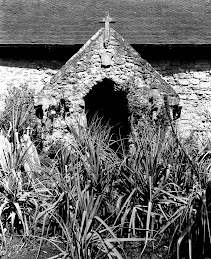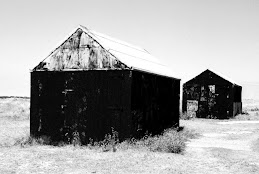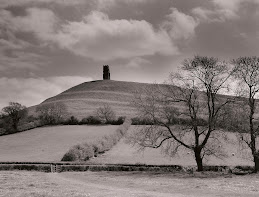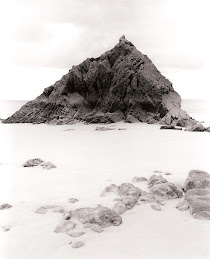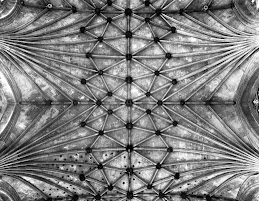Ever pictured yourself as a Balkan bandit?
By and large I suspect not. Nor indeed, mild parson that I am, have I much dreamt of a life of brigandry. Fearless - near desperate sometimes - descent from mountain fortress intent on fell havoc on peaceful valley folk below. That sort of thing.
This though is the glory of the pipe, as filled from Eastern European tobacco and purveyed by harmless, eirenic no doubt, London retailers.
Tonight, through them, I can be the fiercest bandit alive, should ever I wish to be such.
Latakia based baccy in a Churchwarden pipe?
'À rebours' as dear Joris-Karl Huysmans would say.
Thursday, August 28, 2008
"De Mortuis...
...nil nisi bonum." That, we were told, was the golden rule when speaking of the newly dead. They weren't exactly in any decent position to rebut or refute any ill or unkind words, so it was deemed only fair not to say what may well have been on anyone's mind about the fellow.
May well have been a complete basket-case, but best not to harp too much on that tune; refer rather to the deceased as 'mildly eccentric not perhaps completely at ease in the society of others.' Not an untruth, but neither the full picture. A satisfactory code among friends.
It was though dear Harold Laski who so cleverly picked up on where that might lead: 'De mortuis nil nisi bunkum' indeed. Paeans of praise for a right shafter, or charged glasses raised in tribute to an utter stinker.
Better though perhaps that rank hypocrisy than the all too modern habit of the relentless scribing of positive pen-portraits for all deceased and sundry, but most especially for the all too many young people who die so needlessly and early.
I do not want to read that Charlie was well-liked by all in school, eternally cheerful and diligent in work and play. I do not want to be told that Angie was an angel who touched the lives of all she met.
They may well have been just so. But equally they might have been appalling little monsters who terrified their families and terrorised their neighbourhoods.
The only desperate thing that matters now is that they have died, and that death is a horror to those who love them - God too - saints in the making or budding little devils alike.
May well have been a complete basket-case, but best not to harp too much on that tune; refer rather to the deceased as 'mildly eccentric not perhaps completely at ease in the society of others.' Not an untruth, but neither the full picture. A satisfactory code among friends.
It was though dear Harold Laski who so cleverly picked up on where that might lead: 'De mortuis nil nisi bunkum' indeed. Paeans of praise for a right shafter, or charged glasses raised in tribute to an utter stinker.
Better though perhaps that rank hypocrisy than the all too modern habit of the relentless scribing of positive pen-portraits for all deceased and sundry, but most especially for the all too many young people who die so needlessly and early.
I do not want to read that Charlie was well-liked by all in school, eternally cheerful and diligent in work and play. I do not want to be told that Angie was an angel who touched the lives of all she met.
They may well have been just so. But equally they might have been appalling little monsters who terrified their families and terrorised their neighbourhoods.
The only desperate thing that matters now is that they have died, and that death is a horror to those who love them - God too - saints in the making or budding little devils alike.
Tuesday, August 19, 2008
A Fête Worse Than...
...is there indeed anything more to be dreaded than the impending annual fête de village, that terrifying mix of warring egos all gathered together for the alleged greater glory of the parish coffers though in reality assembling but for an occasion of ferocious factional fighting?
You'll not have failed to spot that there has been a lacuna not far short the span of the Missouri River at its very widest (round about where it whacks into the Mississippi if you must know one gathers) of tales of local derring-do and other country matters in these writings of late.
In truth, one has been walkabout much this past year - both interiorly and externally - and thus heart and mind as well as travelling body has been largely absent from Woldean parts.
H has been a brick throughout it must be said at once. If one were to describe this whole thing as a reverse 'Brief Encounter' climax - you know the lines "You've been a long way away." "Yes." "Thank you for coming back to me." - that would be wrongly to impute that romance of an adulterous kind, howsoever unconsummated, had been the fell matter in hand.
Au contraire - as the visiting Victorian Frenchman replied to his English hosts when asked after a particularly rough Channel crossing if he had partaken of luncheon - there have been fewer than two persons involved in this tricksy little shindig of mine. Moi seul indeed has been somewhat lost in transit not found in any wrongful place or arms.
One has though in some ways been off-piste as well as off-colour. 'Male menopause' might be the glib - if singularly organically inapposite metaphor - to have thrust at one by way of explanation. Yes, there has been some nostalgic sense of 'a great future behind him', but then one has always been somewhat of a gloomy cove for whom the obvious impermanence of the fragile glass was always more to the fore than whether its contents should be considered half way up or half way down.
Nor indeed has the time of life quite yet been reached when one by instinct turns first to the Telegraph obits. for the latest news on one's cronies. ("Ah dear Parson 'Mildew' Millhouse. Never knew he toyed with Roman ways in his youth. Quite the proto-Oratorian it seems he was. Too much dry sherry at an impressionable age I'd call it." That sort of thing.)
Though by happenstance, it must be said, it was only the other evening when old Canon 'Hanging' Jeffries - a pal since seminary days - phoned for a chat and enquired, inter alia, how our mutual friend Prior Margaret of the Sisters of the Lost Souls did, to which one could but only reply "Still dead I fear" she having passed on to glory a decade or more since. Bit of a teeth and malt sucking moment for all that one.
No, not death but life has me in a jangle, and jangling one doesn't know for the life of one what quite the matter is. A troubled faith perhaps, though what faith deserves the name if it is not so assailed by frets from time to time? Certainly some ill-bodings on perhaps the irredeemable nature of our land and its people - that rank heresy of course but not an unarguable position.
Bit foxed without a clear route to a bolthole it must be said. Maybe there are no boltholes anymore, the ones one thought were there merely illusory even.
Dear Dom. Robin would never have stooped to the "Get a grip boy" confessorial line, but if he had he might be so tempted now.
Cannot in any way dispute that a firm grip on this wretched - no stripe that, wondrous - village fete heading my way is needed. Squadrons of helpers of all sorts from showers-in to shovers-out to be recruited. Legions of impeccably fair judges to be lined up for all the varied and desperately important competitions from pony dressage to melting-moment cakes. One or two families even to be sharply warned that the archery display is quite not the time to settle ancient festering feuds!
The mettle of a warrior priest must be summonsed from far distant dusty attic rooms. The mantle of battle shaken out of its moth-strewn cupboard. The motto of Hannibal - 'Aut viam inveniam aut viam faciam' - once more to adorn the Palladas crest.
That's the way to do it. I trust!
You'll not have failed to spot that there has been a lacuna not far short the span of the Missouri River at its very widest (round about where it whacks into the Mississippi if you must know one gathers) of tales of local derring-do and other country matters in these writings of late.
In truth, one has been walkabout much this past year - both interiorly and externally - and thus heart and mind as well as travelling body has been largely absent from Woldean parts.
H has been a brick throughout it must be said at once. If one were to describe this whole thing as a reverse 'Brief Encounter' climax - you know the lines "You've been a long way away." "Yes." "Thank you for coming back to me." - that would be wrongly to impute that romance of an adulterous kind, howsoever unconsummated, had been the fell matter in hand.
Au contraire - as the visiting Victorian Frenchman replied to his English hosts when asked after a particularly rough Channel crossing if he had partaken of luncheon - there have been fewer than two persons involved in this tricksy little shindig of mine. Moi seul indeed has been somewhat lost in transit not found in any wrongful place or arms.
One has though in some ways been off-piste as well as off-colour. 'Male menopause' might be the glib - if singularly organically inapposite metaphor - to have thrust at one by way of explanation. Yes, there has been some nostalgic sense of 'a great future behind him', but then one has always been somewhat of a gloomy cove for whom the obvious impermanence of the fragile glass was always more to the fore than whether its contents should be considered half way up or half way down.
Nor indeed has the time of life quite yet been reached when one by instinct turns first to the Telegraph obits. for the latest news on one's cronies. ("Ah dear Parson 'Mildew' Millhouse. Never knew he toyed with Roman ways in his youth. Quite the proto-Oratorian it seems he was. Too much dry sherry at an impressionable age I'd call it." That sort of thing.)
Though by happenstance, it must be said, it was only the other evening when old Canon 'Hanging' Jeffries - a pal since seminary days - phoned for a chat and enquired, inter alia, how our mutual friend Prior Margaret of the Sisters of the Lost Souls did, to which one could but only reply "Still dead I fear" she having passed on to glory a decade or more since. Bit of a teeth and malt sucking moment for all that one.
No, not death but life has me in a jangle, and jangling one doesn't know for the life of one what quite the matter is. A troubled faith perhaps, though what faith deserves the name if it is not so assailed by frets from time to time? Certainly some ill-bodings on perhaps the irredeemable nature of our land and its people - that rank heresy of course but not an unarguable position.
Bit foxed without a clear route to a bolthole it must be said. Maybe there are no boltholes anymore, the ones one thought were there merely illusory even.
Dear Dom. Robin would never have stooped to the "Get a grip boy" confessorial line, but if he had he might be so tempted now.
Cannot in any way dispute that a firm grip on this wretched - no stripe that, wondrous - village fete heading my way is needed. Squadrons of helpers of all sorts from showers-in to shovers-out to be recruited. Legions of impeccably fair judges to be lined up for all the varied and desperately important competitions from pony dressage to melting-moment cakes. One or two families even to be sharply warned that the archery display is quite not the time to settle ancient festering feuds!
The mettle of a warrior priest must be summonsed from far distant dusty attic rooms. The mantle of battle shaken out of its moth-strewn cupboard. The motto of Hannibal - 'Aut viam inveniam aut viam faciam' - once more to adorn the Palladas crest.
That's the way to do it. I trust!
Monday, August 18, 2008
A Timely Gift...
...You will recall (or see archives if not) a fondness of mine for the travel writings of dear Patrick ('Paddy') Leigh Fermor. So morbid have been recent thoughts I hardly dare write his name lest it prompt refulgent and deserved obits. to appear. Ninety-something he must be by now, possibly though dessicated to immortal mummification by the fierce Mani sun.
They do say that his sole novel, 'The Violins of Saint-Jacques', only among his works failed to trouble the scorer as it were. Breathe it not in Babylon, but I've not much quite cared either for his monastic book 'A Time To Keep Silence.' Not that it's a hash by any stretch, making rather a decent smite - as an outsider - at the life to be lived under the Rule of Saint Benedict.
That though is the keen point. The view of the outsider cannot in any place or at any pace comprehend or communicate the utterly alien other world of the insider. An anthropologist's doom that one. Even I, as one once in now out again, cannot say or recall to the new self what once the old self knew and lived.
He could have done worse of course. Graham Greene did for one. Rattled on about "the vow of silence" in 'Monsignor Quixote' I believe it was. Tried warning him that there was no such thing, but the pompous prig avowed he knew better because he was "...a frequent guest of the Abbot."
Guest my arse, is my riposte. That is precisely it. Guests are not there to know anything whatsoever and if they did it would probably shrivel their tender, slightly idolatrous, souls.
But put him in his métier vraiment - the young itinerant with a passion for secular, pre-War European cultures de haut en bas - and there is none to match Paddy for sharpness of observation and richness of insight. From the hideous bursting Burghers of Munich - and their wives - gorging themselves obese in monstrous tribute to their nation, to pale, delicate White Russian exiles all shadow and cobweb yet joyous musical talents; from welcoming farmers and artisans for whom a guest was indeed a holy thing, to lustful young peasant women happy to fetch some colour to a pale Englishman's cheek - all shall be found, and so much more, in but the first two books of his travels on foot from the Hook of Holland to Constantinople in the early 1930s.
Not though merely - as if that were little which it were not - depicting or describing the present, the crisp glory of a near silent European winter forest or the bustle of hard-working, hard-drinking farmers, Paddy takes you through the voluminous historical pasts that swarm through every town and over every field. A battle fought across these river banks in the time of the Caesars, meddling if righteous medieval saints uprooting sacred pagan oaks, Renaissance dynasties or Carolingian factions disputing every mountain and valley - all this is woven into the landscape of rock or river, and thus no single blade of grass even seems less than a thousand years old.
Architecture, art, music, literature all sprung from its place in European time, that too is there. The gross martyring artisans, belching as they slew the troublesome saint, the be-ribboned Landsknecht - in whose elaborate costume the modern quite bursts through the medieval - or the blond warrior giants of The Thirty Years War all pose for their respective portraits or else emerge from pages of wonderful poetic text. Towns, towers, walls of castles and houses - generations of history in stone and wood. The summation of Gothic art and mind in a single decorative carving on a cathedral choir stall.
The slow, occasionally turbulent often brutal, wending of ancient tribes and races across the continent. The rapidly rising modern tide of darkly approaching Nazism. Or lighter than that, the castle prison of Richard the Lionheart or that precise spot on the Danube where Schubert - he too on a walking trip - composed the 'Trout Quintet'. All - as Melville's warp and woof of life - is freely given as a gift to the reader.
Was all this blown away in the flattening horror of the war just to come, or did we simply forget how to see the past in and through a post-war facade of cement, steel and ideology? Would it be possible - permitted even - to take that same journey now, and meet by chance in crowded, smoke-filled (not that alas for certain) inns people who would greet a stranger with kindliness and fill him with food, beer and knowledge of lore, custom, nature and life stretching back over centuries? Somehow I fear I doubt it would.
If you know the story then you do. Some forty years past the first volume - 'A Time of Gifts' - was published; nearly another decade before the second - 'Between the Woods and the Water' - appeared. And now some twenty years later we still wait for the third and final instalment to show.
Time for another gift if you would be so kind Paddy. But if not to be then one's thanks for favours already gratefully received.
They do say that his sole novel, 'The Violins of Saint-Jacques', only among his works failed to trouble the scorer as it were. Breathe it not in Babylon, but I've not much quite cared either for his monastic book 'A Time To Keep Silence.' Not that it's a hash by any stretch, making rather a decent smite - as an outsider - at the life to be lived under the Rule of Saint Benedict.
That though is the keen point. The view of the outsider cannot in any place or at any pace comprehend or communicate the utterly alien other world of the insider. An anthropologist's doom that one. Even I, as one once in now out again, cannot say or recall to the new self what once the old self knew and lived.
He could have done worse of course. Graham Greene did for one. Rattled on about "the vow of silence" in 'Monsignor Quixote' I believe it was. Tried warning him that there was no such thing, but the pompous prig avowed he knew better because he was "...a frequent guest of the Abbot."
Guest my arse, is my riposte. That is precisely it. Guests are not there to know anything whatsoever and if they did it would probably shrivel their tender, slightly idolatrous, souls.
But put him in his métier vraiment - the young itinerant with a passion for secular, pre-War European cultures de haut en bas - and there is none to match Paddy for sharpness of observation and richness of insight. From the hideous bursting Burghers of Munich - and their wives - gorging themselves obese in monstrous tribute to their nation, to pale, delicate White Russian exiles all shadow and cobweb yet joyous musical talents; from welcoming farmers and artisans for whom a guest was indeed a holy thing, to lustful young peasant women happy to fetch some colour to a pale Englishman's cheek - all shall be found, and so much more, in but the first two books of his travels on foot from the Hook of Holland to Constantinople in the early 1930s.
Not though merely - as if that were little which it were not - depicting or describing the present, the crisp glory of a near silent European winter forest or the bustle of hard-working, hard-drinking farmers, Paddy takes you through the voluminous historical pasts that swarm through every town and over every field. A battle fought across these river banks in the time of the Caesars, meddling if righteous medieval saints uprooting sacred pagan oaks, Renaissance dynasties or Carolingian factions disputing every mountain and valley - all this is woven into the landscape of rock or river, and thus no single blade of grass even seems less than a thousand years old.
Architecture, art, music, literature all sprung from its place in European time, that too is there. The gross martyring artisans, belching as they slew the troublesome saint, the be-ribboned Landsknecht - in whose elaborate costume the modern quite bursts through the medieval - or the blond warrior giants of The Thirty Years War all pose for their respective portraits or else emerge from pages of wonderful poetic text. Towns, towers, walls of castles and houses - generations of history in stone and wood. The summation of Gothic art and mind in a single decorative carving on a cathedral choir stall.
The slow, occasionally turbulent often brutal, wending of ancient tribes and races across the continent. The rapidly rising modern tide of darkly approaching Nazism. Or lighter than that, the castle prison of Richard the Lionheart or that precise spot on the Danube where Schubert - he too on a walking trip - composed the 'Trout Quintet'. All - as Melville's warp and woof of life - is freely given as a gift to the reader.
Was all this blown away in the flattening horror of the war just to come, or did we simply forget how to see the past in and through a post-war facade of cement, steel and ideology? Would it be possible - permitted even - to take that same journey now, and meet by chance in crowded, smoke-filled (not that alas for certain) inns people who would greet a stranger with kindliness and fill him with food, beer and knowledge of lore, custom, nature and life stretching back over centuries? Somehow I fear I doubt it would.
If you know the story then you do. Some forty years past the first volume - 'A Time of Gifts' - was published; nearly another decade before the second - 'Between the Woods and the Water' - appeared. And now some twenty years later we still wait for the third and final instalment to show.
Time for another gift if you would be so kind Paddy. But if not to be then one's thanks for favours already gratefully received.
Subscribe to:
Posts (Atom)

